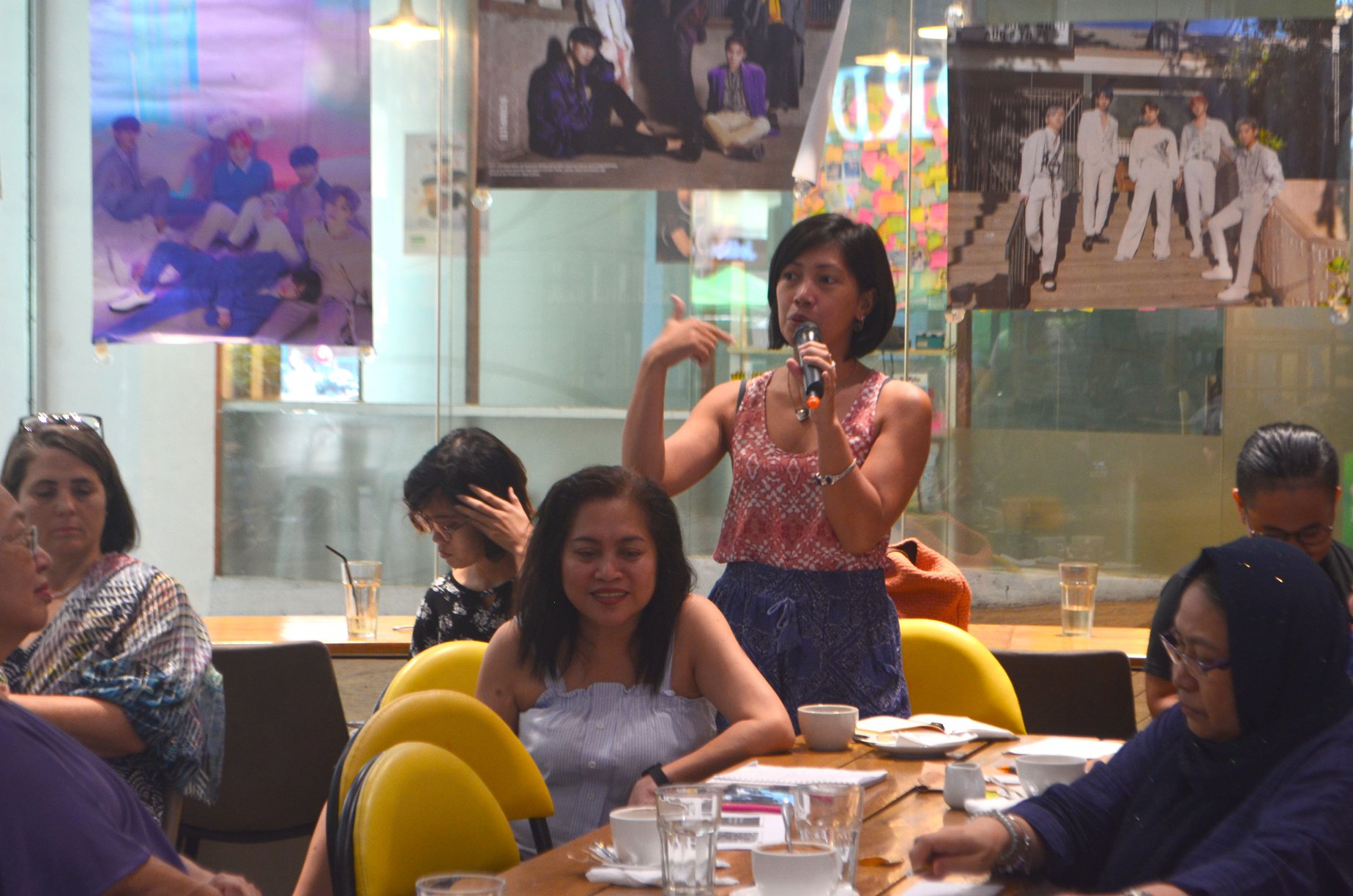The lack of available information and the ineffectiveness of the government to provide services continue to be the main factors contributing to the sorry state of women’s reproductive health (RH) in the country, seven years after the RH Law was passed.
This was the observation bared by two of the staunchest RH advocates in the Philippines during October 19’s Kwentong Kabaro.
Medical doctor Marilen Danguilan gave an impassioned discussion on the lack of sufficient and useful data on women’s RH. According to her, implementing government units such as the Department of Health (DOH) failed to keep track of their programs’ goals and outputs. Major RH concerns such as maternal mortality, for example, seem to be the least of their worries.

Dr. Marilen Danguilan points out how government agencies lack data and statistics relating to women’s reproductive health in the country
“[DOH] doesn’t have proper data in the Philippines on why pregnant women die and how. We don’t even know how to measure,” said Danguilan. She further explained that these are questions that don’t have answers yet should, and have heavy implications on making informed calls in policy-making.
This is despite Section 8 of the RH Law-- signed on December 18, 2012-- asking all LGUs, national and local government hospitals, and other public health units to conduct annual Maternal Death Review and Fetal and Infant Death Review.
According to Danguilan, reproductive health has so many layers of problems yet the government focuses too heavily on only family planning and teenage pregnancy to the point that the other equally as important elements of RH are taken out of the discussion.
“We have reduced the concept of reproductive health and pushed aside its many elements. There is family planning, infertility, maternal health, prevention of maternal deaths, HIV/AIDS, reproductive cancers,” Danguilan explained.
Meanwhile, medical doctor Junice Melgar expressed her frustration with the government’s ineffective pursuits in the provision of health services.
“The government is really ineffective. Starting right from policy-making. The inertia of the government—there’s nothing. Even banner programs like family planning— nothing,” she said.

Dr. Junice Melgar shares her experiences as the director of Likhaan Center for Women’s Health and the women’s movement that advocated for reproductive health
Melgar, who is the director of Likhaan Center for Women’s Health, said there are outstanding shortcomings when it comes to comprehensive sexual education, emergency obstetric care, provincial health services, and accredited birthing centers, among many other concerns.
To address these concerns, Danguilan and Melgar made the following recommendations: 1) monitor the implementation of the Universal Health Care Act for better access to health facilities; 2) create a sub-national health account as a centralized information hub for RH; and 3) install integrated sexuality and reproductive health courses in educational institutions.
Those in attendance also shared the same observations within their respective communities. As a women’s healthcare worker, Mina Tenorio of Likhaan was frustrated at the failures of the country’s health systems. Sarah Dela Rosa of W-DARE showed dismay at the discrimination faced by Persons with Disability (PWDs) when trying to access health services that should be duly provided by the state.
“Nagpasa sila ng batas pero hindi nila kinonsulta lahat ng sectors,” she said, adding that women with disabilities also have RH-related concerns.
Elizabeth Yang of Pilipina and Natividad Pilipina of NTHKC also observed the breakdown of services at the barangay level and attributed this as the cause of the scarce reproductive health knowledge of those within their communities.
Teenage pregnancy
In August 2019, the National Economic and Development Authority (NEDA) declared teenage pregnancy as a “national social emergency.”
Mariquit Melgar of Akbayan Women expressed that giving extra attention to this issue is still necessary that regardless of the many faults in RH implementation because of its prevalence in the communities.
Moreover, Sabrina Gacad of UP Department of Women and Development Studies expressed dismay at the general perception toward teenage pregnancy. “We treat teenage pregnancy as if it’s some sort of social emergency. As if once more a pregnant woman is a burden,” said Gacad.

Participant Sabrina Gacad shares her thoughts on the rising teenage pregnancies in the country
Melgar added that one productive way to approach the issue is to zero in on how these pregnancies put girls’ healths and lives at risk. Unfortunately, it’s the women who have to pay the cost for the lack of reproductive health services that the government should be providing, she noted.
To counter this, the power of the law must be used, said Melgar. “We have to teach women how to use their rights to make our duty bearers accountable.” One means is to harness women’s voices and get behind the mass movement that led to the passing of the law.
“It’s easy to use health as an avenue for organizing. When out in the communities, one can easily see what the practical needs of women truly are,” Dr. Melgar said. “Because of this, the space where women can develop and be empowered has broadened,” she added.
Reviving the feminist fervor

INCITEGov Chair Teresita Quintos-Deles challenges women’s political will in lobbying for women’s issues such as reproductive health rights in her closing statement.
Although the participants observed a noticeable decline in the women’s movement over the years, they continued to encourage each other to revive the feminist fervor.
Mary Racelis and Yasmin Busran Lao of INCITEGov mentioned the need to go back to organizing and building the mass movement.
“We can see through the passing of the RH Law that if we work together, we can succeed. Moving forward, we need the same fire and rigor to continue the fight,” Tenorio noted.
In closing, Teresita Quintos Deles, INCITEGov’s chair, ended the discussion with a challenge: “We need to get political. We are facing a health crisis. Everyone must come together.”
In attendance were representatives from NTHK-C Caloocan Women’s Group, Pilipina, Likhaan Center for Women’s Health, PILIPINA W-DARE, PILAKKK, Grrrl Gang Manila, PASCRES, IPC-ADMU, CSWCD and Akbayan Women.